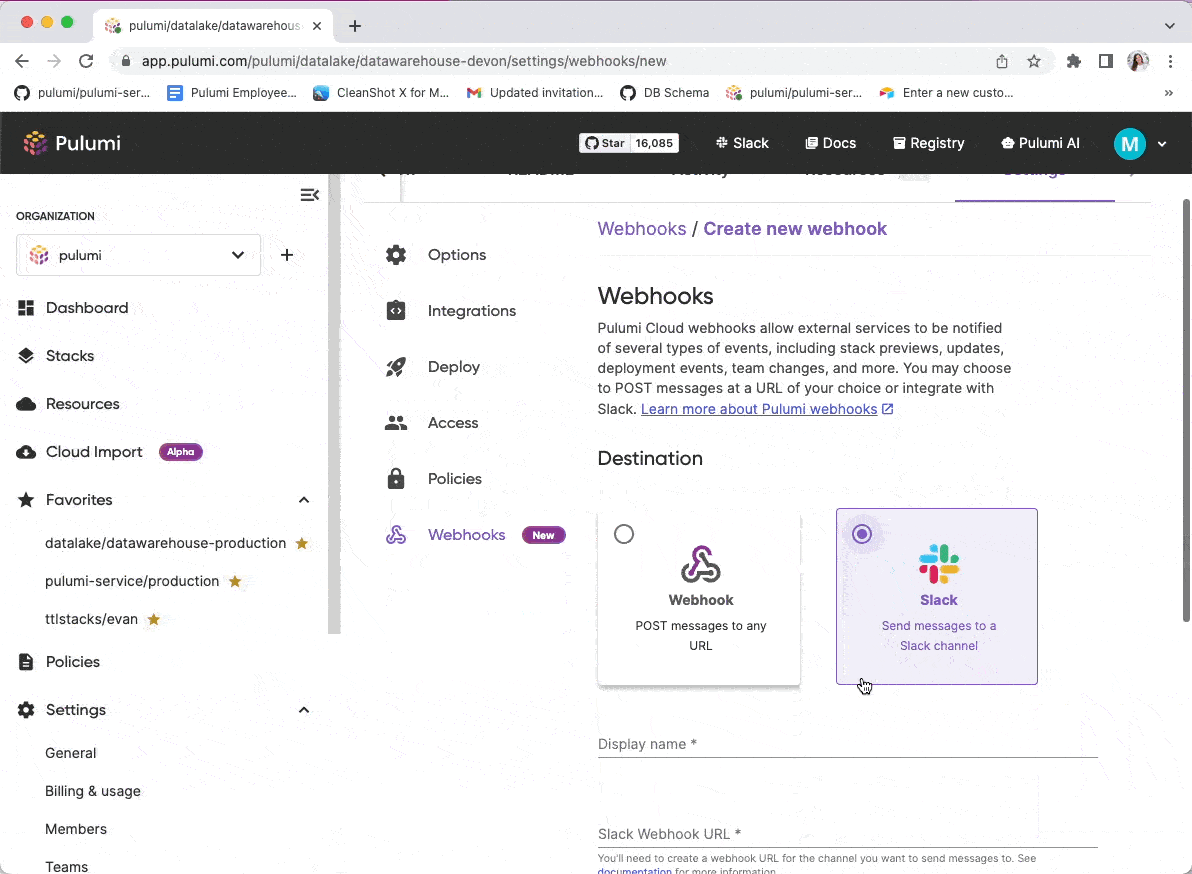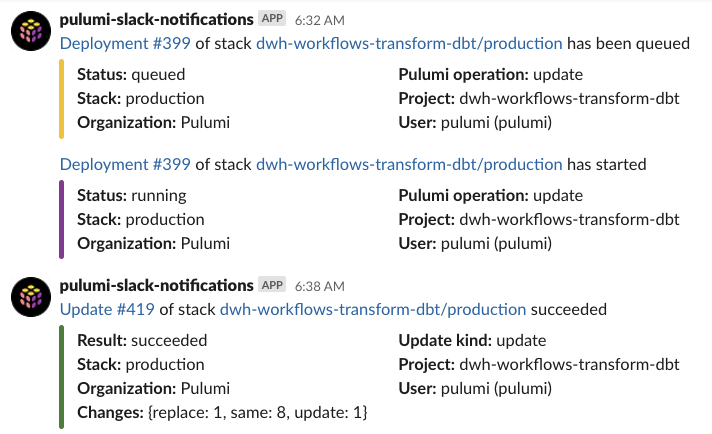Announcing Slack and Deployment Notifications for Pulumi Cloud
Posted on
Today, we are excited to introduce a set of improvements to Pulumi Cloud Webhooks designed to deliver your deployment notifications to where you already spend your time, enabling faster response times to critical issues. Getting your deployment notifications into Slack is now easier than ever on Pulumi Cloud with our new Slack integration. We are also announcing two new improvements to our webhooks feature: Pulumi Deployments events and fine-grained event filtering.
Teams using Pulumi Cloud have been setting up Slack notifications for their stacks using Pulumi Cloud Webhooks. Webhooks can attach to a Pulumi organization or a Pulumi stack. Starting today, customers can set up a Slack integration, for organization or stack notifications, with fewer steps and without needing to host the infrastructure themselves. We have also expanded the types of event notifications and the filtering options on both Pulumi Cloud Webhooks and for the Slack integration.
Pulumi Cloud Webhooks, including the Slack integration, are available to all Pulumi Cloud organizations.
Slack integration

Pulumi Slack notifications enable central visibility for your team. In addition to getting the notification of a successful or failed update, you will have links to take you directly to the stack and directly to the update itself. You can see what Pulumi operation was being run, which user initiated it and the number of resouces changed and unaffected. All of this information in one place lets you spend less time context switching and more time collaborating.
Setting up the Slack Integration
Before today Pulumi customers used Pulumi Cloud Webhooks to set up generic JSON webhooks. When events occur, we send a HTTP POST request to any registered listeners. Webhooks can then be used to send notifications to an app (like Slack), start running automated tests, or even to update another stack! We have now built support for Slack-formatted webhooks, which allow you to quickly enable notifications about your Pulumi stacks and organizations into your Slack workspace by simply providing a Slack incoming webhook URL.
You can either create your own Slack app (or use an existing one you may already have installed in your workspace) or you can use the link below to quickly get started with a predefined Slack app manifest.
Create a Slack app from manifestBy following these steps, which can also be found in our webhooks documentation, in a few clicks you will have a Slack incoming webhook URL which you can use to set up a webhook in Pulumi Cloud, as shown in the GIF below.

There are Pulumi customers with hundreds to thousands of stacks, making setting up webhooks for each via the UI a time consuming task. In order to enable Pulumi notifications at scale, we have added Pulumi Cloud REST API endpoints for creating webhooks as well as Pulumi Service Provider support.
Pulumi Cloud REST API
Create a webhook via the Pulumi Cloud REST API formatted for Slack, as shown in the example below.
curl \
-H "Accept: application/vnd.pulumi+8" \
-H "Content-Type: application/json" \
-H "Authorization: token $PULUMI_ACCESS_TOKEN" \
--request POST \
--data '{
"organizationName":"{organization}",
"projectName":"{project}",
"stackName":"{stack}",
"displayName":"#some-slack-channel",
"payloadUrl":"https://hooks.slack.com/services/...",
"format": "slack",
"active":true
}' \
https://api.pulumi.com/api/orgs/{organization}/{project}/{stack}/hooks
Pulumi Service Provider
The Pulumi Service provider allows you to create Pulumi Cloud resources via Pulumi. You can provision and manage webhooks, including Slack-formatted webhooks, using this provider.
import * as pulumi from "@pulumi/pulumi";
import { Webhook, WebhookFormat, WebhookFilters } from "@pulumi/pulumiservice";
const orgName = "my-org";
const orgWebhook = new Webhook("org-webhook", {
active: true,
displayName: "#my-org-activity-channel",
organizationName: orgName,
payloadUrl: "https://hooks.slack.com/services/...",
format: WebhookFormat.Slack,
filters: [
WebhookFilters.StackCreated,
WebhookFilters.StackDeleted,
WebhookFilters.DeploymentSucceeded,
WebhookFilters.DeploymentFailed,
],
});
const stackWebhook = new Webhook("stack-webhook", {
active: true,
displayName: "#my-stack-activity-channel",
organizationName: orgName,
projectName: pulumi.getProject(),
stackName: pulumi.getStack(),
payloadUrl: "https://hooks.slack.com/services/...",
format: WebhookFormat.Slack,
});
export const orgWebhookName = orgWebhook.name;
export const stackWebhookName = stackWebhook.name;
name: webhook-examples
runtime: yaml
description: An example of provisioning a Pulumi Cloud Webhook via Pulumi Service Provider
resources:
orgWebhook:
type: pulumiservice:index:Webhook
properties:
active: true
displayName: "#my-org-activity-channel"
organizationName: my-org
payloadUrl: "https://hooks.slack.com/services/..."
format: slack
filters:
- stack_created
- stack_deleted
- deployment_succeeded
- deployment_failed
stackWebhook:
type: pulumiservice:index:Webhook
properties:
active: true
displayName: "#my-stack-activity-channel"
organizationName: my-org
projectName: webhook-examples
stackName: dev
payloadUrl: "https://hooks.slack.com/services/..."
format: slack
outputs:
# export the name of the webhooks
orgWebhookName: ${orgWebhook.name}
stackWebhookName: ${stackWebhook.name}
import pulumi
import pulumi_pulumiservice as pulumiservice
org_webhook = pulumiservice.Webhook("orgWebhook",
active=True,
display_name="#my-org-activity-channel",
organization_name="my-org",
payload_url="https://hooks.slack.com/services/...",
format=pulumiservice.WebhookFormat.SLACK,
filters=[
pulumiservice.WebhookFilters.STACK_CREATED,
pulumiservice.WebhookFilters.STACK_DELETED,
pulumiservice.WebhookFilters.DEPLOYMENT_SUCCEEDED,
pulumiservice.WebhookFilters.DEPLOYMENT_FAILED,
])
stack_webhook = pulumiservice.Webhook("stackWebhook",
active=True,
display_name="#my-stack-activity-channel",
organization_name="my-org",
project_name="webhook-examples",
stack_name="dev",
payload_url="https://hooks.slack.com/services/...",
format=pulumiservice.WebhookFormat.SLACK)
pulumi.export("orgWebhookName", org_webhook.name)
pulumi.export("stackWebhookName", stack_webhook.name)
package main
import (
"github.com/pulumi/pulumi-pulumiservice/sdk/go/pulumiservice"
"github.com/pulumi/pulumi/sdk/v3/go/pulumi"
)
func main() {
pulumi.Run(func(ctx *pulumi.Context) error {
orgWebhook, err := pulumiservice.NewWebhook(ctx, "orgWebhook", &pulumiservice.WebhookArgs{
Active: pulumi.Bool(true),
DisplayName: pulumi.String("#my-org-activity-channel"),
OrganizationName: pulumi.String("my-org"),
PayloadUrl: pulumi.String("https://hooks.slack.com/services/..."),
Format: pulumiservice.WebhookFormatSlack,
Filters: pulumiservice.WebhookFiltersArray{
pulumiservice.WebhookFiltersStackCreated,
pulumiservice.WebhookFiltersStackDeleted,
pulumiservice.WebhookFiltersDeploymentSucceeded,
pulumiservice.WebhookFiltersDeploymentFailed,
},
})
if err != nil {
return err
}
stackWebhook, err := pulumiservice.NewWebhook(ctx, "stackWebhook", &pulumiservice.WebhookArgs{
Active: pulumi.Bool(true),
DisplayName: pulumi.String("#my-stack-activity-channel"),
OrganizationName: pulumi.String("my-org"),
ProjectName: pulumi.String("webhook-examples"),
StackName: pulumi.String("dev"),
PayloadUrl: pulumi.String("https://hooks.slack.com/services/..."),
Format: pulumiservice.WebhookFormatSlack,
})
if err != nil {
return err
}
ctx.Export("orgWebhookName", orgWebhook.Name)
ctx.Export("stackWebhookName", stackWebhook.Name)
return nil
})
}
using System.Collections.Generic;
using System.Linq;
using Pulumi;
using PulumiService = Pulumi.PulumiService;
return await Deployment.RunAsync(() =>
{
var orgWebhook = new PulumiService.Webhook("orgWebhook", new()
{
Active = true,
DisplayName = "#my-org-activity-channel",
OrganizationName = "my-org",
PayloadUrl = "https://hooks.slack.com/services/...",
Format = PulumiService.WebhookFormat.Slack,
Filters = new[]
{
PulumiService.WebhookFilters.StackCreated,
PulumiService.WebhookFilters.StackDeleted,
PulumiService.WebhookFilters.DeploymentSucceeded,
PulumiService.WebhookFilters.DeploymentFailed,
},
});
var stackWebhook = new PulumiService.Webhook("stackWebhook", new()
{
Active = true,
DisplayName = "#my-stack-activity-channel",
OrganizationName = "my-org",
ProjectName = "webhook-examples",
StackName = "dev",
PayloadUrl = "https://hooks.slack.com/services/...",
Format = PulumiService.WebhookFormat.Slack,
});
return new Dictionary<string, object?>
{
["orgWebhookName"] = orgWebhook.Name,
["stackWebhookName"] = stackWebhook.Name,
};
});
package generated_program;
import com.pulumi.Context;
import com.pulumi.Pulumi;
import com.pulumi.core.Output;
import com.pulumi.pulumiservice.Webhook;
import com.pulumi.pulumiservice.WebhookArgs;
import java.util.List;
import java.util.ArrayList;
import java.util.Map;
import java.io.File;
import java.nio.file.Files;
import java.nio.file.Paths;
public class App {
public static void main(String[] args) {
Pulumi.run(App::stack);
}
public static void stack(Context ctx) {
var orgWebhook = new Webhook("orgWebhook", WebhookArgs.builder()
.active(true)
.displayName("#my-org-activity-channel")
.organizationName("my-org")
.payloadUrl("https://hooks.slack.com/services/...")
.format("slack")
.filters(
"stack_created",
"stack_deleted",
"deployment_succeeded",
"deployment_failed")
.build());
var stackWebhook = new Webhook("stackWebhook", WebhookArgs.builder()
.active(true)
.displayName("#my-stack-activity-channel")
.organizationName("my-org")
.projectName("webhook-examples")
.stackName("dev")
.payloadUrl("https://hooks.slack.com/services/...")
.format("slack")
.build());
ctx.export("orgWebhookName", orgWebhook.name());
ctx.export("stackWebhookName", stackWebhook.name());
}
}
Pulumi Deployment Notification Events
Pulumi Deployments is a fully managed platform for managing infrastructure at scale. With Pulumi Deployments, you can run a Pulumi infrastructure as code action (a preview, update, destroy or refresh) inside Pulumi Cloud. Pulumi provides scalability, observability and security for deployments. Both Slack-formatted and generic JSON webhooks in Pulumi Cloud now send notifications events on Pulumi Deployments statuses: when a deployment is queued, started, succeeds and fails.

Filtering Notification Events
Event filtering allows you to select which events should be delivered to each webhook. You may want to receive all events, or filter to specific events (only failures, only deployment events, etc.). The following table describes the various event filters available and the context in which they are relevant.
| Filter | Event Kind | Webhook Type | Triggered |
|---|---|---|---|
stack_created | stack | Organization webhooks only | When a stack is created. |
stack_deleted | stack | Organization webhooks only | When a stack is deleted. |
preview_succeeded | stack_preview | Both | When a stack preview succeeds. |
preview_failed | stack_preview | Both | When a stack preview fails. |
update_succeeded | stack_update | Both | When a stack update succeeds. |
update_failed | stack_update | Both | When a stack update fails. |
destroy_succeeded | stack_update | Both | When a stack destroy succeeds. |
destroy_failed | stack_update | Both | When a stack destroy fails. |
refresh_succeeded | stack_update | Both | When a stack refresh succeeds. |
refresh failed | stack_update | Both | When a stack refresh fails. |
deployment_queued | deployment | Both | When a deployment is queued. |
deployment_started | deployment | Both | When a deployment starts running. |
deployment_succeeded | deployment | Both | When a deployment succeeds. |
deployment_failed | deployment | Both | When a deployment fails. |
Wrapping up
We hope you and your team can streamline deployment related notifications to where you spend your time. Our webhooks improvements enable ChatOps workflows and more visibility into your infrastructure. As always, please let us know if you have feedback on the feature by opening an issue in the Pulumi Cloud requests repository or if you have other features you would like to see in Pulumi Cloud.
Happy building! 👷


